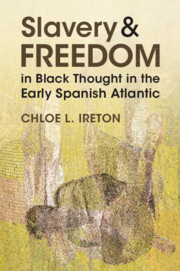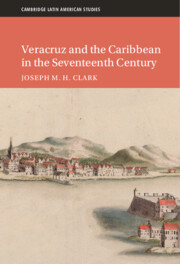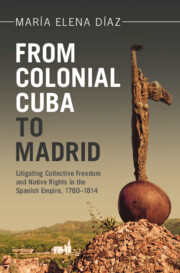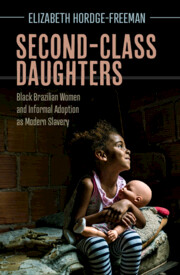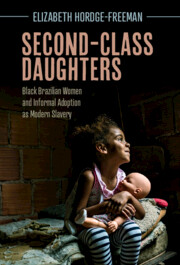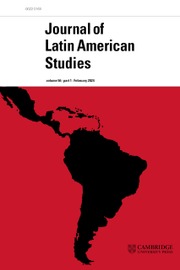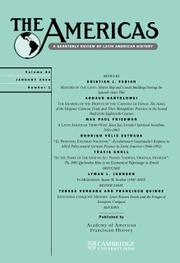Slavery and Freedom in Black Thought in the Early Spanish Atlantic
Weaving together thousands of archival fragments, this study explores a shared Black Atlantic world where the meanings of slavery and freedom were fiercely contested and claimed. It recreates the worlds of extraordinary individuals and communities in the long sixteenth century, whilst mapping the development of early modern Black thought about slavery and freedom. From a free Black mother's embarkation license to cross the Atlantic Ocean, to an enslaved Sevillian woman's epistles to her freed husband in New Spain, to an enslaved man's negotiations with prospective buyers on the auction block in Mexico City, to a Black man's petition to reclaim his liberty after his illegitimate enslavement, Chloe L. Ireton explores how Africans and their descendants reckoned with laws and theological discourses that legitimized the enslavement of Black people and the varied meanings of freedom across legal jurisdictions. Their intellectual labor reimagined the epistemic worlds of slavery and freedom in the early modern Atlantic.
- Assembles thousands of archival fragments into historical frames, drawing on methods in historical geography, microhistory, cultural history, history of ideas, and intellectual history
- Sheds light on the emergence of thick spheres of communication among free and enslaved Black people between key port towns
- Explores how free and enslaved Black people in the early Atlantic world conceptualized two strands of political thought – freedom and slavery
Reviews & endorsements
‘This book is an astounding, sweeping, and beautifully written intellectual exploration of the rich, complicated, and worldly lives of people of African descent as they negotiated experiences of enslavement and emancipation in the early modern Iberian Atlantic. It charts an extraordinary intellectual cartography of early modern Black living that upends how scholars think of Black movement and agency at the dawn of and decades into the Atlantic slave trade.’ Yesenia Barragan, Rutgers University
‘Ireton guides the reader through the early-modern archive pointing to sources that bring into focus themes long held to be unimaginable. The narrative before us is a testament to archival presence engendered by the thoughts and actions of enslaved Africans and their early-modern descendants. She charts new ground in this brilliant study of slavery and freedom.’ Herman Bennett, author of African Kings and Black Slaves: Sovereignty and Dispossession in the Early Modern Atlantic
‘If there was ever a body of early modern Hispanic Black Atlantic thought, as the archive of ideas on freedom, rights, and livelihood, Ireton provides its fullest account through the examination of the lives and thoughts of myriads of Black people born in Africa, Europe, and the Americas. Behind the letters, trials, and petitions examined in this book, readers can piece together the lives of these Black men and women both in metropolitan Spain and the colonies, in tandem, as never before.’ Alex Borucki, University of California, Irvine
‘In her masterful exploration of a ‘lettered Black public sphere’ in the Spanish Atlantic, Ireton traces how Black subjects mobilized a transatlantic web of information to enact freedom. Her subjects gossip, litigate, acquire wealth, and theorize freedom as they circulate, spreading knowledge in surprising ways. Beautifully written, deeply researched, and centered in life stories, Ireton provocatively expands upon our knowledge of freedom and unfreedom.’ Karen Graubart, author of Republics of Difference: Religious and Racial Self-Governance in the Spanish Atlantic World
‘This book is a marvel of methodological inventiveness and scholarly rigor. Drawing on expansive archival material, Ireton grounds readers in the ‘thick spheres of communication’ that enslaved and free people of African descent engaged in to shape ideas and debates about slavery and freedom across the Spanish empire.’ Tamara Walker, author of Exquisite Slaves: Race, Clothing and Status in Colonial Lima
‘Extensively researched and creatively argued, this groundbreaking study is replete with richly detailed vignettes featuring the voices of Africans and people of African descent in sixteenth-century Seville and Spanish America. Ireton reminds us of Black individuals’ agency and dynamism within the early modern Iberian world, mustering a wealth of new evidence to document their multiform efforts to safeguard their liberties and loved ones.’ David Wheat, author of Atlantic Africa and the Spanish Caribbean, 1570–1640
‘In 2023, the Nigerian-based artist El Anatsui premiered a three-part installation, Behind the Red Moon, at the Tate Modern in London. In its materiality, form, and scale, Behind the Red Moon visualizes the entanglements of commodification, imperialism, and the transatlantic slave trade as well as the creativity and resilience of the African diaspora. A detail of El Anatsui’s artwork from this show graces the cover of Slavery and Freedom in Black Thought in the Early Spanish Atlantic by Chloe L. Ireton, offering an apt parallel to Ireton’s work. Much as El Anatsui weaves together thousands of liquor bottle caps and plastic scraps to transforms detritus into monumental art, so Ireton assembles archival fragments from across the Iberian world into a strikingly radical new whole. Coaxed by Ireton’s close and careful scholarship, incomplete paper trails resolve into textured possibilities that generate a fuller image of black intellectual life.’ Nathalie Miraval, Ler História
Product details
December 2024Hardback
9781009533485
340 pages
235 × 159 × 26 mm
0.64kg
Available
Table of Contents
- Introduction
- 1. Proving Freedom: Documenting Alhorría
- 2. Imagining Freedom: Black Atlantic Communities in Sevilla
- 3. Purchasing Freedom: Economics of Liberty in New Spain
- 4. Defining Freedom: Infrastructures of Black Political knowledge between Sevilla & Mexico City
- 5. Reclaiming Freedom: The Illegitimacy of Slavery in Black Thought
- 6. Practicing Freedom: Documenting Capital
- Coda: Felipa de la Cruz's World & Letters.

